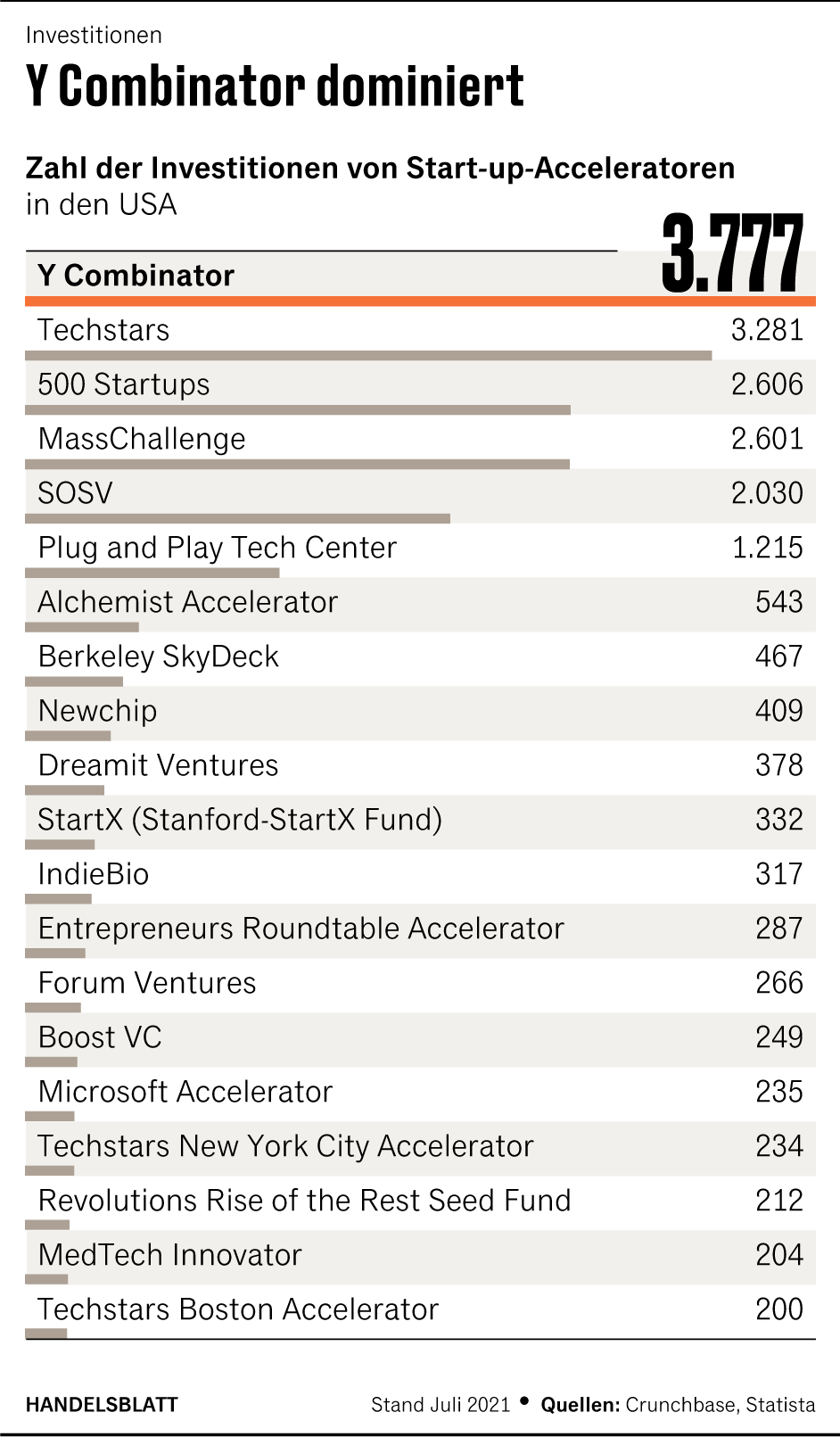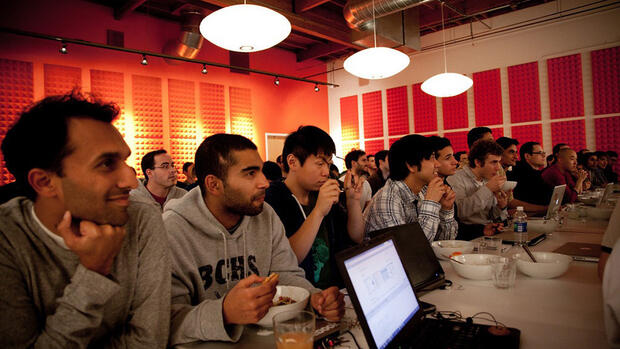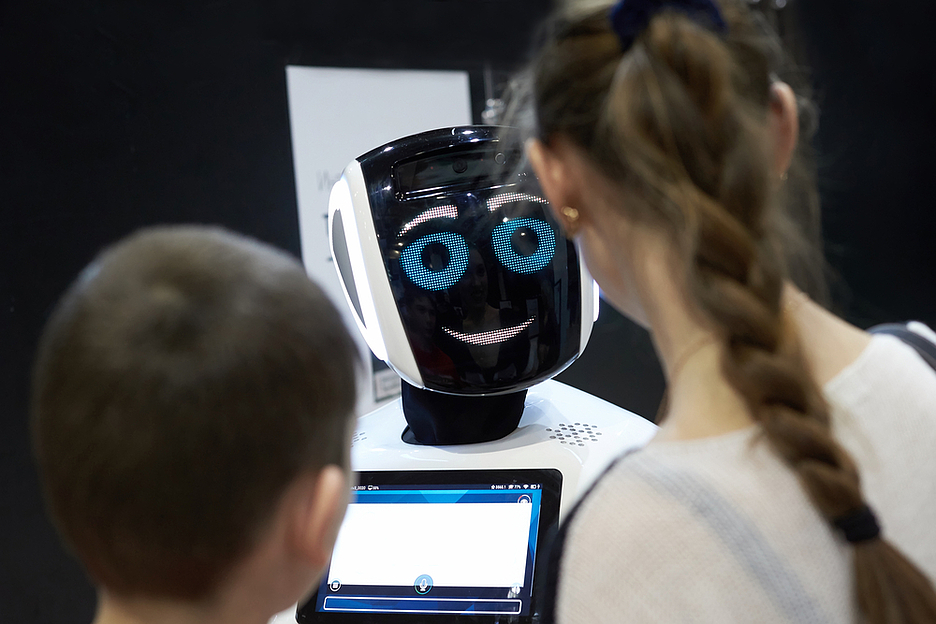San Francisco Airbnb, Stripe or Dropbox: the renowned start-up company Y Combinator has produced some of the most valuable companies in the world. The Silicon Valley-based organization has supported around 4,000 companies.
The youngest group of sponsored companies recently presented their business models to a selected number of investors and journalists. The Handelsblatt was there and presents the six start-ups from Germany that were accepted.
The Y Combinator is an institution in Silicon Valley that has helped shape the landscape for companies. “The Y Combinator is the gold standard,” said Christian Jorg, Managing Partner US at the German Accelerator start-up program funded by the Federal Ministry of Economics.
The organization is well networked and gives good access to donors. “Follow-up financing is much easier than with other accelerators,” Jorg said.
If the Y Combinator, or YC for short, initially focused on promoting a small number of companies, the focus was greatly expanded. Already in the last round, more than 400 companies were admitted.
Voize: Language assistant for the healthcare sector
In the most recent round, 17,000 young companies applied. 414 were selected. Of these, six come from Germany. Fabio Schmidberger is one of the founders in the program. He is the CEO of Voize, a company that enables care documentation via voice input. Employees in hospitals, for example, should no longer have to fill out complex forms, but should simply be able to dictate important information.

Schmidberger hopes to receive decisive support from YC in the further development of the company. “The expertise at YC is the best,” Schmidberger said. He and his co-founders would be supported by outstanding professionals in building their company during the three-month program.
When asked why his company had just been accepted, he had a clear answer: “We were only taken on the second attempt. Our biggest advantage was that we were able to show great progress.“ The business model has paid off. Sales had increased tenfold.
Multiple attempts at the YC are not the exception, but the rule. In the most recent round, the program counted 57 percent of companies that have completed the application program more than once.
Flagright: Real-time check against money laundering
Baran Özkan is co-founder and CEO of the Munich-based start-up Flagright. His company offers a solution to help companies in the financial sector to identify criminals in real time. Thanks to a simple integration, companies could quickly and easily meet the requirements of money laundering regulation.
“Y Combinator is the best address in the world,” Özkan explained the decision for the program. His company was also interested in the Berlin program Techstars, Y Combinator was ultimately faster.
With the admission to the funding, Özkan, Schmidberger and the other founders in the program not only get access to specialists, training and contact with funders.
YC itself also invests in the companies. Each start-up gets $ 125,000 and in return gives seven percent of the company’s shares to YC. YC is adding an additional $375,000 for the companies it has taken on this year. So start-ups can raise up to $ 500,000.
Glocally: Sustainable delivery service
Fabian Warmdt is CEO of the Munich-based start-up Glocally. The company promises sustainable and fast deliveries in e-commerce. The delivery should be CO2-neutral. For this, the company relies on e-cargo bikes.
Warmdt makes a devastating judgment about comparable programs in Germany and Europe. “Accelerators in Germany or Europe are not effective. We even got into a couple, which was a waste of time. It prevents you from building products and winning customers,“ Warmdt criticized.
>>> Read here: After meat and milk substitutes, egg alternatives are now booming – market researchers see a billion-dollar potential
The YC is structured differently. The focus is on imparting the specialist knowledge of experienced founders. The young companies would be too heavily burdened with time and could still learn a lot. “One of our partners, for example, founded Yahoo. That’s so much experience and knowledge, you can’t find that anywhere in the concentration,“ Warmdt said.
Pina Earth: Platform for Sustainable Forestry
Pina Earth from Munich made it to the YC with a platform for forest owners. The young company wants to qualify and reward sustainable forestry with a collection of digital tools. By using aerial image data and artificial intelligence, the CO2 binding of forests can be precisely measured and tracked, the start-up promises.
YC not only provides the start-up with a good network, it also provides technical support. “We will be closely accompanied by Gustaf Alströmer, who has also made many investments in climate tech start-ups as a business angel,” said Gesa Biermann, co-founder and CEO of Pina Earth.
AiSupervision: Recording manual production steps
The company AiSupervision from Mannheim is aimed at industrial customers. CEO Sascha Lang wants to build an operating system for production lines. The system should also be able to record manual production steps in production on the basis of artificial intelligence and thus relieve foremen, for example. “We are live in 15 factories,” Lang said at the presentation of his company.
Anyone who has looked at factories outside Tesla or Amazon knows how often paper and pens are still in use to monitor the production process. As a result, a lot of money and efficiency would be lost. AiSupervision wants to solve this problem, Lang said.
Gavel: Live shopping for retailers
The Berlin start-up Gavel has made it to the YC with a concept for live shopping. Co-founder Marvin Musialek explained that many retailers still have not set up online sales. Gavel wanted to change that and initially focused on comic book stores.
Musialek said: “Y Combinator invented the Accelerator principle, and we are always convinced of it.“ The support and financing from the USA is important – also for a future expansion. “The US is a very strong and decisive market for us, but will rather play a role with us in the medium term,” Musialek said.
More: German start-ups prove to be popular takeover targets – especially in the USA









